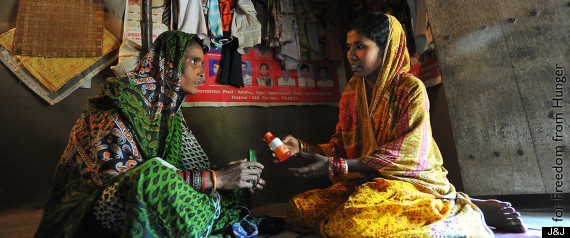In global development, we talk about impact and scale in aggregate terms, but it's also important to retain a focus on those that we serve as individuals. This keeps us grounded, focused and inspired. It reminds us of why we do what we do.
Nandini Nath, or as her neighbors call her, "Doctor Mom," lives in Sanoanko, Orissa, India.
Several years ago, when she needed cash to buy seeds and pesticides for her barley and potato crops, her only option was to take a loan from her local loan shark who charged her 60% interest. She took the loan because she didn't have any other choice.
When Nandini had a chance to join a self-help group through Gram-Utthan, Freedom from Hunger's microfinance partner in Orissa, she jumped at it. For the first time, she had access to capital with terms that she could manage.
Like all of Freedom from Hunger's partners, Gram-Utthan embraces an integrated (or value-added) approach to microfinance, so financial services are only the beginning. Nandini also received financial literacy training and access to health education and services. More importantly though, she found her calling and her community gained a vital resource.
Because she had some formal education, good people skills and the confidence of her community, she was selected to become a Village Health Volunteer.
After her initial training about how to prevent and manage common illnesses, she received her own "Medicine Point," a wooden box stocked with an array of health products such as Oral Rehydration Solution (ORS), water purification tablets, de-worming tablets and other simple, but essential, medicines and health products.

Every month, Nandini holds two health education forums (on topics such as diarrhea prevention and treatment, women's health, and the feeding of young children) for the self-help groups in her community.
With oversight from a licensed pharmacist and a health supervisor, she helps her neighbors attend to their basic health needs and when they require more advanced care, she refers them to other local health resources. Nandini is playing her part toward achieving U.N. Millennium Development Goals 4 and 5 (relating to child and maternal health respectively), by ensuring that pregnant women access prenatal care.
Every September, the world's political elite, international development leaders, philanthropists and socially-engaged corporations flock to New York for the annual meetings of the UN General Assembly and Clinton Global Initiative.
In conjunction with my participation in the Clinton Global Initiative meeting, I was invited to speak at a Millennium Development Goal-focused luncheon, hosted by Johnson & Johnson. The panel discussed the range of innovative solutions currently being delivered through frontline health workers.
These workers, like Nandini, are having a significant impact in rural areas, where access to medical care is limited. Research shows that, in a similar program implemented with our partner Bandhan, 96% of mothers are breastfeeding within an hour of birth, in comparison to 61% before the program was implemented. 88% of mothers are treating their sick children with Oral Rehydration Solution, a dramatic increase from 60%.
The people of Sanoanko see the impact first hand. They no longer have to walk for miles to get simple health advice or deal with minor health issues. They have Nandini.
Along with all the value that Nandini adds, her neighbors now have access to savings and loan products through Gram-Utthan to help them deal with unexpected medical costs, which can cripple a family financially or cause them to delay seeking treatment.
Today, microfinance reaches more than 200 Million women globally, including 92 million in India alone. It provides a platform with ready-made scale, through which Freedom from Hunger reaches women and their families with other important social benefits.
With over 150 local partners and the support of generous funders like Johnson and Johnson, Freedom from Hunger is reaching more than 4.4 million women in 20 countries throughout Africa, Asia and Latin America, helping them to address the root causes of their poverty and achieve food security for their families.
Like politicians, we work best when we work together. Freedoms from Hunger and the Microcredit Summit Campaign have come together to establish a shared goal of reaching 50 million women by 2020.
By leveraging the existing microfinance infrastructure, these services can be delivered at a cost of less than $1.59 per client per year. As these programs continue to scale, the costs decrease further. Over time, value-added services have been shown to enhance the financial performance of microfinance institutions that offer them through enhanced customer loyalty and improved repayment rates. For them it's not just social responsibility, it's smart business.
But this isn't about us and it's not about the microfinance institutions. It's about the people that we serve together...the women like Nandini.
Follow Freedom From Hunger on twitter at @FreeFromHunger